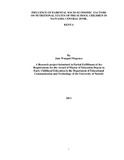| dc.description.abstract | This study is set out to establish the factors which affect the nutritional status of the pre-school children in Naivasha Central zone in Naivasha District. The study targeted 108 respondents. This involved 20 schools teachers. 40 parents and 48 pre-school children. The zone was chosen because the pre-school children here expressed most profound signs of diverse nutritional levels. Through' self administered questionnaires and oral interviews. the study elicited views 0n the determinants 0n nutritional status of pre-school children in Naivasha Central zone.
In this study piloting was done prior to the actual research. This was done by use of simple random sampling of one school in the neighbouring district before the actual research then test re-test technique was used to test the reliability. The researcher got the research permit from the National council for Science and Technology and wrote an introductory letter to the targeted schools in the zone before proceeding to the field to collect data.
The data was collected and analyzed with the help of a computer. This enabled the researcher to enter and analyze quantitative data using descriptive statistics in order' to obtain the mean, frequencies, percentages and correlation coefficient. According to the study, the findings that 60% of the targeted pre-schooI parents lacked adequate knowledge on the provision of nutritious food and only' 40% of the parents have attained academic standards of above secondary level which is below average. Findings on marital status indicated that where wives are involved (67.5%) in food acquisition. the children have a high MUAC (l3cm and above) value confirming provision of nutritious foods.
In respect to income levels, it was found out that it is only 29.2% of the parents who earned over Kshs. 10,000 per month which was adequate to purchase healthy foods. Finally findings on family size showed that less than half (37.5%) have families of four children and below. This made it possible for them to provide nutritious foods to their children. The researcher therefore recommends that parents, caregivers, pre-school teachers and the entire community should be educated about different nutritional needs of children in order for them to provide healthy diets to pre-school children. 'There is also a need for the parents and communities in the research area to initiate feedings programmes in the pre- schools. | en_US |

